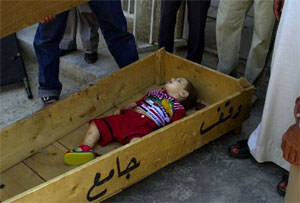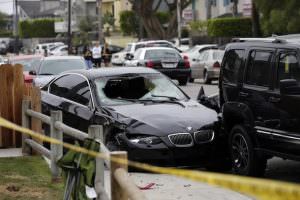A Culture of Atrocity
The veteran foreign correspondent writes that while physical courage is common on the battlefield, moral courage is not. When young men and women are sent to occupy a foreign land -- whether Vietnam, Gaza or Iraq -- and they encounter constant danger, a population hostile to their presence and a faceless but determined enemy, the value of human life inevitably becomes relative and killing all too quickly becomes murder.
All troops, when they occupy and battle insurgent forces, as in Iraq, or Gaza or Vietnam, are swiftly placed in what the psychiatrist Robert Jay Lifton terms “atrocity-producing situations.” In this environment, surrounded by a hostile population, simple acts such as going to a store to buy a can of Coke or driving down a street means you can be killed. This constant fear and stress leads troops to view everyone around them as the enemy. The hostility is compounded when the enemy, as in Iraq, is elusive, shadowy and hard to find. The rage that soldiers feel after a roadside bomb explodes, killing or maiming their comrades, is one that is easily directed over time to innocent civilians who are seen as supporting the insurgents. It is a short psychological leap, but a massive moral one. It is a leap from killing — the shooting of someone who has the capacity to do you harm — to murder — the deadly assault against someone who cannot harm you. The war in Iraq is now primarily about murder. There is very little killing. American Marines and soldiers have become, after four years of war, acclimated to atrocity.
The American killing project is not described in these terms to the distant public. The politicians still speak in the abstract of glory, honor and heroism, of the necessity of improving the world, in lofty phrases of political and spiritual renewal. The press, as in most wars, is slavishly compliant. The reality of the war — the fact that the occupation forces have become, along with the rampaging militias, a source of terror to most Iraqis — is not transmitted to the American public. The press chronicles the physical and emotional wounds visited on those who kill in our name. The Iraqis, those we kill, are largely nameless, faceless dead. Those who kill large numbers of people always claim it as a regrettable but necessary virtue.
The reality and the mythic narrative of war collide when embittered combat veterans return home. They find themselves estranged from the world around them, a world that still believes in the myth of war and the virtues of the nation.
Tina Susman in a June 12 article in the Los Angeles Times gave readers a rare glimpse into this side of the war. She wrote about a 17-year-old Iraqi boy killed by the wild, random fire unleashed by American soldiers in a Baghdad neighborhood following a bomb blast. These killings, which Iraqis say occur daily, are seldom confirmed, but in this case the boy was the son of a local Los Angeles Times employee.
Iraqi physicians, overseen by epidemiologists at Johns Hopkins University’s Bloomberg School of Public Health, published a study last year in the British medical journal The Lancet. The study estimated that 655,000 more people than normal have died in Iraq since coalition forces invaded the country in March 2003. This is more than 20 times the estimate of 30,000 civilian deaths that President Bush gave in a speech last December.
Of the total 655,000 estimated “excess deaths,” 601,000 resulted from violence. The remaining deaths occurred from disease and other causes, according to the study. This is about 500 additional violent deaths per day throughout the country.
Lt. Col. Andrew J. Bacevich, a Vietnam veteran who is a professor of international relations at Boston University, estimated last year that U.S. troops had killed “tens of thousands” of innocent Iraqis through accidents or reckless fire.
Official figures have ceased to exist. The Iraqi government no longer releases the number of civilian casualties and the U.S. military does not usually give reports about civilians killed or wounded by U.S. forces.
“It’s a psychological thing. When one U.S. soldier gets killed or injured, they shoot in vengeance,” Alaa Safi told the Los Angeles Times. He said his brother, Ahmed, was killed April 4 when U.S. troops riddled the streets of their southwestern Baghdad neighborhood with bullets after a sniper attack.
War is the pornography of violence. It has a dark beauty, filled with the monstrous and the grotesque. The Bible calls it “the lust of the eye” and warns believers against it. War allows us to engage in primal impulses we keep hidden in the deepest, most private interiors of our fantasy life. It allows us to destroy not only things but human beings. In that moment of wholesale destruction, we wield the power of the divine, the power to give or annihilate life. Armed units become crazed by the frenzy of destruction. All things, including human beings, become objects — objects to either gratify or destroy or both. Almost no one is immune. The contagion of the crowd sees to that.
Human beings are machine-gunned and bombed from the air, automatic grenade launchers pepper hovels and neighborhoods with high-powered explosives, and convoys tear through Iraq, speeding freight trains of death. These soldiers and Marines have at their fingertips the heady ability to call in firepower that obliterates landscapes and villages. The moral universe is turned upside down. No one walks away uninfected. War thrusts us into a vortex of barbarity, pain and fleeting ecstasy. It thrusts us into a world where law is of little consequence.
It takes little in wartime to turn ordinary men and women into killers. Most give themselves willingly to the seduction of unlimited power to destroy. All feel the peer pressure to conform. Few, once in battle, find the strength to resist gratuitous slaughter. Physical courage is common on a battlefield. Moral courage is not.
Military machines and state bureaucracies, which seek to make us obey, seek also to silence those who return from war and speak the truth. Besides, the public has little desire to puncture the mythic, heroic narrative. The essence of war, which is death, is carefully masked from view. The few lone journalists who attempt to speak the truth about war, to describe the experience of constantly being on the receiving end of American firepower, soon become pariahs, no longer able to embed with the military, dine out with officials in the Green Zone or get press credentials. And so the vast majority of the press lies to us, although not overtly; it is the lie of omission, but it is a lie nonetheless.
The veterans who return, even if they do not speak about the atrocities they have committed or witnessed in Iraq, will spend the rest of their lives coping with what they have done. They will suffer delayed reactions to stress. They will endure, as have those who returned from Vietnam, a crisis of faith. The God they knew, or thought they knew, failed them. The high priests of our civic religion, from politicians to preachers to television pundits, who promised them glory and honor through war betrayed them.
War is always about betrayal, betrayal of the young by the old, of idealists by cynics and of troops by politicians. This bitter knowledge of betrayal is seeping into the ranks of the American military. It is bringing us a new wave of enraged and disenfranchised veterans who will never again trust the country that sent them to war.
We make our heroes out of clay. We laud their gallant deeds. We give them uniforms with colored ribbons for the acts of violence they committed or endured. They are our false repositories of glory and honor, of power, of self-righteousness, of patriotism and self-worship, all that we want to believe about ourselves. They are our plaster saints, the icons we cheer to defend us and make us and our nation great. They are the props of our demented civic religion, our love of power and force, our belief in our right as a chosen nation to wield this force against the weak. This is our nation’s idolatry of itself.
Prophets are not those who speak of piety and duty from pulpits — there are few people in pulpits worth listening to. The prophets are the battered wrecks of men and women who return from Iraq and find the courage to speak the halting words we do not want to hear, words that we must hear and digest in order to know ourselves. These veterans, the ones who dare to tell the truth, have seen and tasted how war plunges us into barbarity, perversion, pain and an unchecked orgy of death. And it is their testimonies, if we take the time to listen, which alone can save us.
Your support matters…Independent journalism is under threat and overshadowed by heavily funded mainstream media.
You can help level the playing field. Become a member.
Your tax-deductible contribution keeps us digging beneath the headlines to give you thought-provoking, investigative reporting and analysis that unearths what's really happening- without compromise.
Give today to support our courageous, independent journalists.

You need to be a supporter to comment.
There are currently no responses to this article.
Be the first to respond.